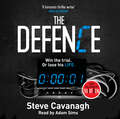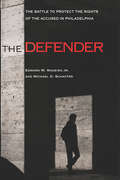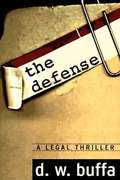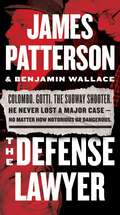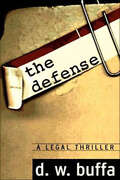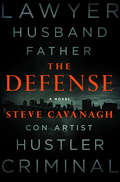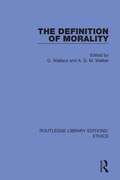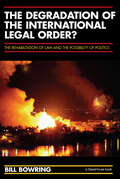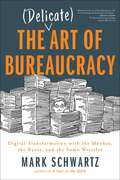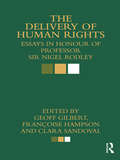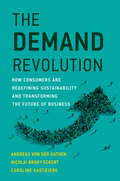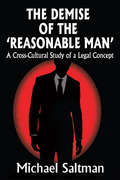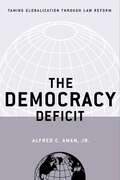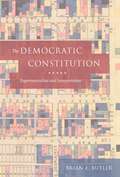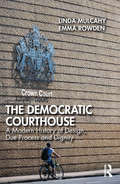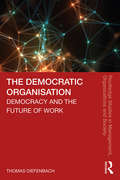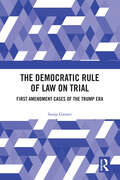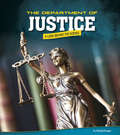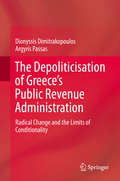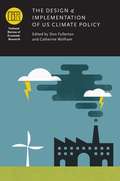- Table View
- List View
The Defence: Win the trial. Or lose his life. (Eddie Flynn Series)
by Steve CavanaghThe truth has no place in a courtroom. The truth doesn't matter in a trial.The only thing that matters is what the prosecution can prove.Eddie Flynn used to be a con artist. Then he became a lawyer. Turned out the two weren't that different.It's been over a year since Eddie vowed never to set foot in a courtroom again. But now he doesn't have a choice. Olek Volchek, the infamous head of the Russian mafia in New York, has strapped a bomb to Eddie's back and kidnapped his ten-year-old daughter Amy. Eddie only has 48 hours to defend Volchek in an impossible murder trial - and win - if wants to save his daughter. Under the scrutiny of the media and the FBI, Eddie must use his razor-sharp wit and every con-artist trick in the book to defend his 'client' and ensure Amy's safety. With the timer on his back ticking away, can Eddie convince the jury of the impossible?Lose this case and he loses everything.(p) 2015 Orion Publishing Group
The Defender: The Battle to Protect the Rights of the Accused in Philadelphia
by Edward W. Madeira Jr. Michael D. SchafferLong before the Supreme Court ruled that impoverished defendants in criminal cases have a right to free counsel, Philadelphia’s public defenders were working to ensure fair trials for all. In 1934, when penniless defendants were routinely railroaded through the courts without ever seeing a lawyer, Philadelphia attorney Francis Fisher Kane helped create the Voluntary Defender Association, supported by charity and free from political interference, to represent poor people accused of crime. When the Supreme Court’s 1963 decision Gideonv. Wainwright mandated free counsel for indigent defendants, the Defender (as it is now known) became more essential than ever, representing at least 70 percent of those caught in the machinery of justice in the city. Its groundbreaking work in juvenile advocacy, homicide representation, death-row habeas corpus petitions, parole issues, and alternative sentencing has earned a national reputation. In The Defender, Edward Madeira, past president of the Defender’s Board of Directors, and former Philadelphia Inquirer journalist Michael Schaffer chart the 80-plus-year history of the organization as it grew from two lawyers in 1934 to a staff of nearly 500 in 2015. This is a compelling story about securing justice for those who need it most.
The Defense (Joseph Antonelli Book #1)
by D. W. BuffaIt was a one-way ticket out of his self-imposed isolation and into the courtroom on the right side of justice. It was a favor for his old friend Judge Horace Woolner. It was a once-in-a-lifetime chance to serve as special prosecutor in a case against a man sworn to uphold the law, Marshall Goodwin, the chief deputy district attorney accused of having his former wife murdered. It was an opportunity Joseph Antonelli couldn't walk away from. But Antonelli is walking into more than he bargained for. The Goodwin case renews his appetite for the practice of law, and although Antonelli is determined to remain on the side of justice, there are many shades between right and wrong. And Antonelli may be over his head when Russell Gray, an urbane, worldly, and wealthy man from a prominent Portland family, is found murdered in his living room. Horace Woolner's wife stands accused of the crime. With justice and love on the line, the stakes couldn't be higher. In this stunning look at our legal system and our hearts, D. W. Buffa delivers on the promise of The Defense and takes us into the dark recesses of our courtrooms and our souls, where there are no easy answers.
The Defense Lawyer: The Barry Slotnick Story
by James Patterson Benjamin WallaceFor more than a decade, Barry Slotnick never lost a case—no matter how notorious or dangerous his clients. Everyone deserves the best defense. Known for his sharp mind, sharp suits, and bold courtroom strategies, Bronx-native Barry Slotnick is known as the best criminal lawyer in the US. He calls himself &“Liberty&’s Last Champion.&” Slotnick mediates Bette Midler&’s bathhouse contract and represents John Gotti, &“The Dapper Don.&” He defends &“Subway Shooter&” Bernie Goetz and negotiates future First Lady Melania Trump&’s pre-nup. His unparalleled legal brilliance defines a profession, a city—and an era.
The Defense: A Legal Thriller
by D. W. BuffaDynamite defense attorney Joseph Antonelli has never lost a case--or felt the sting of conscience for letting the guilty go free. "I can deceive anyone," he says, "and no one more quickly or more completely than myself." Now the man he most admires, the honorable Judge Rifkin, has asked him a favor: Defend a drug dealer accused of raping his twelve-year-old stepdaughter. Yet in D. W. Buffa's The Defense, Antonelli's acceptance of the case sets in motion an explosive chain of corruption, betrayal, and murder that will leave no one unscathed. . . .
The Defense: A Novel (Eddie Flynn #1)
by Steve Cavanagh"If you're a fan of John Grisham, Scott Turow, and Brad Meltzer, then you will be a fan of Steve Cavanagh's The Defense." --Nelson DeMille, #1 New York Times bestselling author of Radiant AngelEddie Flynn used to be a con artist. Then he became a lawyer. Turns out the two aren't that different.Former con artist turned lawyer Eddie Flynn gave up the law a year ago after a disastrous case, and he vowed never to step foot in a courtroom again. But now he doesn't have a choice. The head of the Russian mob in New York City, on trial for murder, has kidnapped Eddie's ten-year-old daughter: Eddie has to take this case whether he likes it or not.Using his razor-sharp wit and every con, bluff, grift, and trick in the book, Eddie has only forty-eight hours to defend an impossible murder trial. And if he loses this case, he loses everything.
The Definition of Morality
by G. Wallace A. D. M. WalkerOriginally published in 1970, the papers in this volume discuss the essential and defining characteristics of morality and moral issues and examine how moral views differ from political views, moral beliefs from religious beliefs, and moral judgements from aesthetic judgements. Some of the chapters discuss problems of method and shed light on the complex conditions which any successful definition of morality must satisfy. Taken collectively, these papers reflect he wide variety of approaches adopted by contemporary philosophers.
The Degradation of Ethics Through the Holocaust
by Paul E. WilsonThis book discusses ethical behavior through the genocidal stages of the Holocaust. Paul E. Wilson first looks at the antisemitism in Germany and Europe beginning in the decades preceding the Nazis reign of terror, and goes on to discuss the ethical decisions made in the initial stages that moved society toward genocide. The author maintains that the stages of genocide represent subtle changes that can be happening within a society in response to the moral choices made by actors. By giving attention to the stages of genocide in the Holocaust, this book contributes to the overall understanding of how the Holocaust was possible, and encourages the moral community to join the watch for the development of genocide in the modern world.
The Degradation of the International Legal Order?: The Rehabilitation of Law and the Possibility of Politics
by Bill BowringProviding the basis for critical engagement with the pessimism of the contemporary age, The Degradation of the International Legal Order? argues passionately for a rehabilitation of the honour of historic events and processes, and of their role in generating legal concepts. Drawing primarily from the Marxian tradition, but also engaging with a range of contemporary work in critical theory and critical legal and human rights scholarship, this book analyses historical and recent international events and processes in order to challenge their orthodox interpretation. What is thus proposed is a new evaluation of international legal principles and human rights norms, the revolutionary content of which, it is argued, turns them from mere rhetoric into powerful weapons of struggle. Accessibly written, but theoretically sophisticated, this original and timely book is intended for critical teachers and students of international law, human rights, and international relations, as well as legal and political activists.
The Delicate Art of Bureaucracy: Digital Transformation with the Monkey, the Razor, and the Sumo Wrestler
by Mark Schwartz Mark SchwartzMark Schwartz, author of leadership classics A Seat at the Table and The Art of Business Value, reveals a new (empowering) model for the often soul-shattering, frustrating, Kafkaesque nightmare we call bureaucracy. Through humor, a healthy dose of history and philosophy, and real-life examples from his days as a government bureaucrat, Schwartz shows IT leaders (and the whole of business) how to master the ways of the Monkey, the Razor, and the Sumo Wrestler to create a lean, learning, and enabling bureaucracy. For anyone frustrated by roadblocks, irritated the business can't move fast enough, or suffering under the weight of crushing procedures, this book is for you. No matter your role, you need a playbook for bureaucracy. This is it. With this playbook, you can wield bureaucracy as a superpower and bust through it at the same time
The Delimitation of the Continental Shelf between Denmark, Germany and the Netherlands
by Alex G. Oude ElferinkAlex G. Oude Elferink's detailed analysis of the negotiations between Denmark, Germany and The Netherlands concerning the delimitation of their continental shelf in the North Sea makes use of the full range of government archives in these three States. He looks at the role of international law in policy formulation and negotiations, and explores the legal context, political considerations and, in particular, oil interests which fed into these processes. He also explains why the parties decided to submit their disputes to the International Court of Justice and looks at the preparation of their pleadings and litigation strategy before the Court. The analysis shows how Denmark and The Netherlands were able to avoid the full impact of the implications of the Court's judgment by sidestepping legal arguments and insisting instead on political considerations.
The Delivery of Human Rights: Essays in Honour of Professor Sir Nigel Rodley
by Geoff GilbertThe Delivery of Human Rights reflects on two overlapping issues in international human rights law: how can existing norms be better implemented and effected, and how can other branches of international law or other international actors be used so as to provide an improved delivery of those norms. Rather than simply looking at the content of the rights, this book will also explore how the framers’ intention that individuals benefit from the norms can be achieved. The book is written and published in honour of Professor Sir Nigel Rodley KBE. It celebrates his career as an academic and practitioner in the area of human rights. Professor Rodley acted as the UN Special Rapporteur on Torture from 1993 to 2001 and is currently a member of the UN Human Rights Committee. He is also a member of the International Commission of Jurists. Since 2001 he has been a Member of the UN Human Rights Committee, established under the International Covenant on Civil and Political Rights. In 1998 he was knighted in the Queen's New Year's Honours list for services to Human Rights and International Law and in 2000 he received an honorary LLD from Dalhousie University. He is Professor and Chair of the Human Rights Centre, University of Essex, having taught there since 1990. The contributors to this volume are notable experts in the area of human rights law and include Paul Hunt, Malcolm Evans, Michael O’Flaherty and David Weissbrodt. The book addresses such topics as the Role of Special Rapporteurs, how can the absolute prohibition of torture be properly implemented, Responsibility to Protect, non-state actors, including businesses, and human rights.
The Delivery of Regenerative Medicines and Their Impact on Healthcare
by Dame Julia Polak Catherine D. PrescottNow that prohibitions against stem cell research are relaxing, it is time for the field to move forward with the advances that promise to eliminate so much human suffering. However, it would be naive to ignore the fact that regenerative medicines pose a whole new set of challenges to an industry sector that for decades has geared itself to the deve
The Demand Revolution: How Consumers Are Redefining Sustainability and Transforming the Future of Business (Management on the Cutting Edge)
by Andreas von der Gathen Nicolai Broby Eckert Caroline KastbjergHow consumer desire for sustainability is powering the first demand-driven, transformative megatrend—and how business leaders can make the most of this important moment.Sustainability is rocking the business world as profoundly as any global trend of the past, from electrification to digitalization. But unlike previous revolutions, this one is being driven by consumers, for whom environmentally sound practices matter as much as price, quality, and brand. In The Demand Revolution, Andreas von der Gathen, Nicolai Broby Eckert, and Caroline Kastbjerg offer a strategic framework for winning these consumers—and taking advantage of the vast commercial opportunity presented by sustainability as the first demand-driven, transformative megatrend.The first movers in the Demand Revolution will be able to create enduring competitive advantages and high entry barriers built around redesigned business model ecosystems and customer loyalty, the authors explain, but this will require a critical adjustment in thinking and approach. Companies, first of all, have to catch up with consumers, who see themselves on a demand curve far beyond what companies currently perceive. Business leaders must shift their focus from the cost of sustainability to its potential for generating growth and long-term profits. This, in turn, means recognizing that the classic adoption curves for innovations—and the strategic playbooks derived from those insights—no longer apply. The Demand Revolution shows business leaders how to look beyond easy fixes and incremental outcomes and instead pursue high-risk, high-reward moves geared toward the source of exponential growth: the world&’s consumers.
The Demise of the Reasonable Man: A Cross-cultural Study of a Legal Concept
by Michael SaltmanJudges in most societies often resort to resolving disputes by means of applying a criterion of reasonableness. In The Demise of the'Reasonable Man' Michael Saltman explores the ways in which reasonableness varies from one legal culture to another, defined by the relative presence or absence of centralized political power. In non-politically centralized societies, Saltman says, judges seek meanings underlying human behavior, and try to place reasonableness within a societal and cultural context. This is possible because primitive societies are relatively homogenous in their values and tend towards consensus when determining what constitutes reasonable behavior. In contrast, modern judges resort to standards of reasonableness only when the legal standard is unclear. Saltman contrasts judges in politically centralized societies, who, in the absence of such consensus, have the authority to determine, on the basis of that authority, what constitutes reasonableness. This rich volume references case studies drawn from ethnographic fieldwork, historical sources, and law reports to demonstrate differences in judicial attitudes toward reasonableness.
The Democracy Deficit: Taming Globalization Through Law Reform
by Alfred C. Aman Jr.Economic globalization has had a chilling effect on democracy since markets now do some of the work that governments used to do through the political process. More than two decades of deregulation have made a healthy economy appear to depend on unrestrained markets. But appearances are misleading—globalization is also a legal and political process. The future of democracy in the twenty-first century depends on the ability of citizens to reclaim a voice in taming globalization through domestic politics and law reform. "The book's topic could not be more important: how do we adapt contemporary democratic governance- and contemporary administrative law- to the challenge of a globalizing world?"—Kal Raustiala, UCLA School of Law Can citizens govern globalization? Aman argues that they can, and that domestic law has a crucial role to play in this process. He proposes to redefine the legal distinction between public and private to correspond to the realities of the new role of the private sector in delivering public services, and thereby to bring crucial sectors of globalization back within the scope of democratic reform. Basing his argument on the history of the policies that led to globalization, and the current policies that sustain it, Aman advocates specific reforms meant to increase private citizens' influence on globalization. He looks at particular problem areas usually thought to be domestic in nature, such as privatization, prisons, prescription drugs, and the minimum wage, as well as constitutional structural issues such as federalism and separation of powers.
The Democratic Constitution: Experimentalism and Interpretation
by Brian E. ButlerThe Supreme Court is seen today as the ultimate arbiter of the Constitution. Once the Court has spoken, it is the duty of the citizens and their elected officials to abide by its decisions. But the conception of the Supreme Court as the final interpreter of constitutional law took hold only relatively recently. Drawing on the pragmatic ideals characterized by Charles Sanders Peirce, John Dewey, Charles Sabel, and Richard Posner. Brian E. Butler shows how this conception is inherently problematic for a healthy democracy. Butler offers an alternative democratic conception of constitutional law, “democratic experimentalism,” and applies it in a thorough reconstruction of Supreme Court cases across the centuries, such as Brown v. Board of Education, Citizens United v. Federal Election Commission, Lucas v. South Carolina Coastal Council, and Lochner v. New York. In contrast to the traditional tools and conceptions of legal analysis that see the law as a formally unique and separate type of practice, democratic experimentalism combines democratic aims and experimental practice. Butler also suggests other directions jurisprudential roles could take: for example, adjudication could be performed by primary stakeholders with better information. Ultimately, Butler argues persuasively for a move away from the current absolute centrality of courts toward a system of justice that emphasizes local rule and democratic choice.
The Democratic Courthouse: A Modern History of Design, Due Process and Dignity
by Linda Mulcahy Emma RowdenThe Democratic Courthouse examines how changing understandings of the relationship between government and the governed came to be reflected in the buildings designed to house the modern legal system from the 1970s to the present day in England and Wales. The book explores the extent to which egalitarian ideals and the pursuit of new social and economic rights altered existing hierarchies and expectations about how people should interact with each other in the courthouse. Drawing on extensive public and private archives kept by the Ministry of Justice, but also using case studies from other jurisdictions, the book details how civil servants, judges, lawyers, architects, engineers and security experts have talked about courthouses and the people that populate them. In doing so, it uncovers a changing history of ideas about how the competing goals of transparency, majesty, participation, security, fairness and authority have been achieved, and the extent to which aspirations towards equality and participation have been realized in physical form. As this book demonstrates, the power of architecture to frame attitudes and expectations of the justice system is much more than an aesthetic or theoretical nicety. Legal subjects live in a world in which the configuration of space, the cues provided about behaviour by the built form and the way in which justice is symbolised play a crucial, but largely unacknowledged, role in creating meaning and constituting legal identities and rights to participate in the civic sphere. Key to understanding the modern day courthouse, this book will be of interest to legal scholars and students in all fields of law, sociology, political science, psychology and criminology.
The Democratic Organisation: Democracy and the Future of Work (Routledge Studies in Management, Organizations and Society)
by Thomas DiefenbachPrevailing models of organisation divide people into owners, managers and employees, forcing especially the latter to obey, to behave, and to function well within a hierarchical and managerial pecking order. However, there is no natural law suggesting the need for such organisations, not in market economies and definitely not in modern democratic societies – and there is no justification for such types of organisation. Arguing that most current organisations are orthodox, hierarchical, anti-democratic, oppressive, unfair, and unjust, this book presents a viable alternative, a better type of organisation – the democratic organisation. Diefenbach develops and provides step by step a systematic, comprehensive, thorough, and detailed general model of the democratic organisation. He describes the democratic organisation’s fundamental principles, values, governance, management, structures, and processes, and the ways it functions and operates both within the organisation and towards others and the environment. Crucially, and most importantly, the democratic organisation provides the institutions and organisational context for individuals to maintain and pursue their fundamental freedoms, inalienable rights, and dignity; to manage organisations in democratic, participative, and cooperative ways; and to conduct business in considerate, balanced, and sustainable ways. This book will be of interest to researchers, academics, practitioners, and students in the fields of management, organisation studies, strategic management, business ethics, entrepreneurship, and family business.
The Democratic Rule of Law on Trial: First Amendment Cases of the Trump Era
by Sonja GroverThis book examines selected high-profile U.S. First Amendment cases occurring during the Trump era as a vehicle for exploring a possible fundamental commonality in understanding the democratic rule of law globally. In each of these cases, the adjudicating body’s analytical legal strategy is discussed in terms of how it reinforces or detracts from the democratic rule of law. It was and continues to be highly internationally anticipated as to what legal examples are being set by this established democracy when confronted by legal contests between the former Trump administration and those alleging their rights were somehow violated by the executive of that time. Thus, the book is instructive for an international audience on the essential role of the courts in protecting democracy through providing, where supported by the law and the facts, a remedy for the aggrieved comparatively powerless. The book will be essential reading for academics and researchers working in the areas of constitutional law, politics and human rights.
The Department of Justice: A Look Behind the Scenes (U.S. Government Behind the Scenes)
by Michael BurganDescribes the history of the Department of Justice, and how it has evolved, what the pressing issues are today, and what lies ahead in the near future. Takes a potentially dry topic and makes it accessible for the younger reader. Sidebars highlight important issues and figures in history.
The Depoliticisation of Greece’s Public Revenue Administration: Radical Change and the Limits of Conditionality
by Dionyssis Dimitrakopoulos Argyris PassasThis book analyses the reform of Greece’s public revenue administration promoted by its international lenders under the successive bailout agreements put in place since 2010. In particular, it shows how an integral part of the finance ministry was converted into an independent agency operating largely outside the direct control of the finance minister. The authors focus on the implementation of this major reform and demonstrate the impact of domestic decisions on the increasing specificity of the international lenders’ demands and the concomitant lack of confidence in the Greek political élite’s commitment to the reform package. This book helps readers understand the response to the eurozone crisis (especially, the conditionality of funding), Greece’s reform capacity with a focus on its tax administration, and the expansion of the scope of non-majoritarian institutions in Western democracies.
The Derivative Action in Asia: A Comparative and Functional Approach
by Michael Ewing-Chow Dan W. Puchniak Harald BaumThis in-depth comparative examination of the derivative action in Asia provides a framework for analysing its function, history and practical application and examines in detail how derivative actions law works in practice in seven important Asian jurisdictions (China, Hong Kong, India, Japan, Korea, Taiwan and Singapore). These case studies allow an evaluation of a number of the leading Western comparative corporate law and governance theories which have come to define the field over the last decade. By debunking some of these critically important theories, this book lays the foundation for an accurate understanding of the derivative action in Asia and a re-examination of the regulation of the derivative action around the world.
The Derrick Bell Reader
by Richard Delgado Jean StefancicLawyer, activist, teacher, writer: for over 40 years, Derrick Bell has provoked his critics and challenged his readers with uncompromising candor and progressive views on race and class in America. A founder of Critical Race Theory and pioneer of the use of allegorical stories as tools of analysis, Bell's groundbreaking work shatters conventional legal orthodoxies and turns comfortable majoritarian myths inside out. Edited and with an extensive introduction by leading critical race theorists Richard Delgado and Jean Stefancic, The Derrick Bell Reader reflects the tremendous breadth of issues that Bell has grappled with over his phenomenal career, including affirmative action, black nationalism, legal education and ethics. Together, the selections offer the most complete collection of Derrick Bell's writing available today.
The Design and Implementation of US Climate Policy
by Don Fullerton Catherine WolframEconomic research on climate change has been crucial in advancing our understanding of the consequences associated with global warming as well as the costs and benefits of the various policies that might reduce emissions of greenhouse gases. As nations work to develop climate policies, economic insights into their design and implementation are ever more important. With a balance between theoretical and empirical approaches, The Design and Implementation of US Climate Policy looks at the possible effects of various climate policies on a range of economic outcomes. The studies that comprise the volume examine topics that include the coordination--or lack thereof--between the federal and state governments, implications of monitoring and enforcing climate policy, and the specific consequences of various climate policies for the agricultural, automotive, and buildings sectors.
